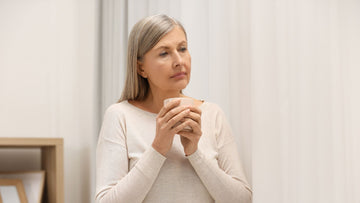
For many women, coffee is more than a morning drink. It’s a ritual, a comfort, and a beloved source of energy. But during menopause, that same cup of coffee may start to feel less like a friend and more like a foe.
Menopause brings hormonal changes that can affect everything from hot flashes and sleep to mood swings and bone health. And while caffeine isn’t the cause of these symptoms, it can sometimes make them worse. Understanding how coffee interacts with your body during this stage of life can help you make more informed choices—without necessarily giving up your daily ritual.
Hormones and Caffeine: A Sensitive Balance
As women enter perimenopause and menopause, estrogen and progesterone levels fluctuate and then decline. These changes can alter the way the body metabolises caffeine.
-
Slower Metabolism: With age and hormonal shifts, caffeine may stay in the system longer, intensifying side effects like jitteriness or disrupted sleep.
-
Heightened Sensitivity: Declining estrogen may make the nervous system more reactive to stimulants, which explains why caffeine can feel harsher during menopause compared to earlier in life.
This means a cup of coffee that once felt energising may suddenly cause anxiety, insomnia, or worsen menopausal symptoms.
Coffee and Hot Flashes
Hot flashes are one of the most common (and frustrating) symptoms of menopause. Research has shown mixed results, but many women report caffeine as a trigger.
-
Stimulant Effect: Caffeine activates the central nervous system and can raise heart rate and blood pressure, both of which may worsen the sensation of a hot flash.
-
Individual Variation: While not every woman experiences this link, those who do often find reducing or eliminating caffeine significantly lessens the frequency and intensity of hot flashes.
Coffee and Sleep Disruptions
Menopause is notorious for causing sleep problems—thanks to night sweats, hormonal fluctuations, and changes in circadian rhythm. Add caffeine to the mix, and it can be a recipe for restless nights.
-
Extended Half-Life: Caffeine can remain active in the body for up to 6–8 hours, and even longer in women with slower metabolism. An afternoon latte may keep you wide awake at midnight.
-
Deep Sleep Reduction: Studies show caffeine reduces restorative slow-wave sleep, which women in menopause need more than ever to counter fatigue and stress.
Cutting back or switching to caffeine-free alternatives can be one of the simplest ways to improve sleep quality during this stage.
Coffee and Mood Changes
Mood swings, irritability, and anxiety are common during menopause, driven largely by fluctuating hormones. Caffeine can compound these issues:
-
Anxiety Trigger: Caffeine increases adrenaline, which can mimic or worsen feelings of anxiety.
-
Mood Swings: The “high” from caffeine is often followed by a crash, which may contribute to irritability.
-
Hormone Interaction: With lower estrogen, which normally helps regulate mood and calm the nervous system, caffeine’s effects can feel more pronounced.
While a morning coffee may feel comforting, for many women it becomes a double-edged sword.
Bone Health Considerations
Another factor worth noting is bone health. During menopause, declining estrogen accelerates bone loss, increasing the risk of osteoporosis.
-
Calcium Absorption: High caffeine intake may interfere with calcium absorption, which is crucial for bone strength.
-
Bone Density: Some studies have found that heavy coffee drinkers (more than 4 cups per day) may experience greater bone density loss.
Moderation is key—and balancing caffeine intake with calcium-rich foods or supplements may help mitigate risk.
Finding Balance Without Losing the Ritual
So, is coffee a friend or foe in menopause? The truth is, it depends on the woman. Some can still enjoy one small cup in the morning without issues, while others find even a single cup triggers symptoms.
What’s important is recognising how your body responds. If coffee worsens hot flashes, robs you of sleep, or heightens anxiety, reducing or replacing it may dramatically improve quality of life.
But giving up coffee doesn’t have to mean giving up the ritual.
That’s where alternatives like Not Coffee come in. Designed to look, brew, and taste like coffee without any caffeine or stimulants, Not Coffee gives women the comfort of their morning cup without the side effects. Made from roasted chicory, organic carob, and chickpeas, it’s gentle on the gut, hormone-friendly, and safe for women in all stages of life—including menopause.
Whether brewed as an instant latte or in a stovetop espresso, it keeps the ritual alive—helping women feel grounded while supporting their health.
Practical Tips for Women in Menopause
If you’re navigating menopause and wondering whether to cut back on coffee, here are a few practical steps:
-
Notice Patterns: Track your symptoms—do hot flashes, anxiety, or sleepless nights worsen on days you drink coffee?
-
Cut Back Gradually: Instead of going cold turkey, try reducing by one cup at a time to avoid withdrawal headaches.
-
Switch to Alternatives: Replace an afternoon coffee with herbal tea or a caffeine-free coffee alternative like Not Coffee.
-
Hydrate More: Caffeine is mildly dehydrating, and dehydration can make symptoms like fatigue and brain fog worse.
-
Prioritise Sleep Hygiene: If sleep is your biggest challenge, avoid caffeine after 12pm and create a calming bedtime routine.
Conclusion
Coffee has been a faithful companion for many women throughout life, but in menopause, it can sometimes feel more like a foe. From worsening hot flashes to disrupting sleep and mood, caffeine often adds fuel to the hormonal fire.
The empowering news is that women don’t have to choose between their health and their ritual. By cutting back, listening to their bodies, and embracing nourishing alternatives, they can continue enjoying that daily moment of comfort—without the drawbacks.
In the end, menopause is about balance. And sometimes, balance starts with what’s in your cup.





